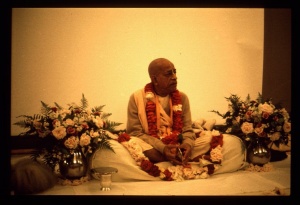SB 6.14.1: Difference between revisions
m (1 revision(s)) |
No edit summary |
||
| Line 1: | Line 1: | ||
{{info | {{info | ||
|speaker= | |speaker=King Parīkṣit | ||
|listener= | |listener=Śukadeva Gosvāmī | ||
}} | }} | ||
[[Category:Srimad-Bhagavatam - Canto 06 Chapter 14|s01 ]] | |||
[[Category:Bhagavatam Verses Spoken by Pariksit Maharaja - Vanisource|061401]] | |||
<div style="float:left">'''[[Srimad-Bhagavatam]] - [[SB 6|Sixth Canto]] - [[SB 6.14: King Citraketu's Lamentation|Chapter 14: King Citraketu's Lamentation]]'''</div> | |||
<div style="float:right">[[File:Go-previous.png|link=SB 6.14 Summary]] '''[[SB 6.14 Summary]] - [[SB 6.14.2]]''' [[File:Go-next.png|link=SB 6.14.2]]</div> | |||
{{RandomImage}} | |||
==== TEXT 1 ==== | ==== TEXT 1 ==== | ||
<div class="verse"> | |||
<div | :śrī-parīkṣid uvāca | ||
śrī-parīkṣid uvāca | :rajas-tamaḥ-svabhāvasya | ||
rajas-tamaḥ-svabhāvasya | :brahman vṛtrasya pāpmanaḥ | ||
brahman vṛtrasya pāpmanaḥ | :nārāyaṇe bhagavati | ||
nārāyaṇe bhagavati | :katham āsīd dṛḍhā matiḥ | ||
katham āsīd dṛḍhā matiḥ | |||
</div> | </div> | ||
| Line 18: | Line 23: | ||
==== SYNONYMS ==== | ==== SYNONYMS ==== | ||
<div class="synonyms"> | |||
<div | ''śrī-parīkṣit uvāca''—King Parīkṣit inquired; ''rajaḥ''—of the mode of passion; ''tamaḥ''—and of the mode of ignorance; ''sva-bhāvasya''—having a nature; ''brahman''—O learned ''brāhmaṇa''; ''vṛtrasya''—of Vṛtrāsura; ''pāpmanaḥ''—who was supposedly sinful; ''nārāyaṇe''—in Lord Nārāyaṇa; ''bhagavati''—the Supreme Personality of Godhead; ''katham''—how; ''āsīt''—was there; ''dṛḍhā''—very strong; ''matiḥ''—consciousness. | ||
śrī-parīkṣit | |||
</div> | </div> | ||
| Line 26: | Line 30: | ||
==== TRANSLATION ==== | ==== TRANSLATION ==== | ||
<div class="translation"> | |||
<div | |||
King Parīkṣit inquired from Śukadeva Gosvāmī: O learned brāhmaṇa, demons are generally sinful, being obsessed with the modes of passion and ignorance. How, then, could Vṛtrāsura have attained such exalted love for the Supreme Personality of Godhead, Nārāyaṇa? | King Parīkṣit inquired from Śukadeva Gosvāmī: O learned brāhmaṇa, demons are generally sinful, being obsessed with the modes of passion and ignorance. How, then, could Vṛtrāsura have attained such exalted love for the Supreme Personality of Godhead, Nārāyaṇa? | ||
</div> | </div> | ||
| Line 34: | Line 37: | ||
==== PURPORT ==== | ==== PURPORT ==== | ||
<div class="purport"> | |||
In this material world, everyone is obsessed with the modes of passion and ignorance. However, unless one conquers these modes and comes to the platform of goodness, there is no chance of one's becoming a pure devotee. This is confirmed by Lord Kṛṣṇa Himself in [[Bhagavad-gita As It Is (1972)|''Bhagavad-gītā'']] ([[BG 7.28 (1972)|BG 7.28]]): | |||
:''yeṣāṁ tv anta-gataṁ pāpaṁ'' | |||
:''janānāṁ puṇya-karmaṇām'' | |||
:''te dvandva-moha-nirmuktā'' | |||
:''bhajante māṁ dṛḍha-vratāḥ'' | |||
"Persons who have acted piously in previous lives and in this life, whose sinful actions are completely eradicated and who are freed from the duality of delusion, engage themselves in My service with determination." Since Vṛtrāsura was among the demons, Mahārāja Parīkṣit wondered how it was possible for him to have become such an exalted devotee. | |||
</div> | |||
<div style="float:right; clear:both;">[[File:Go-previous.png|link=SB 6.14 Summary]] '''[[SB 6.14 Summary]] - [[SB 6.14.2]]''' [[File:Go-next.png|link=SB 6.14.2]]</div> | |||
" | __NOTOC__ | ||
</div> | __NOEDITSECTION__ | ||
__NOTOC__ | |||
Revision as of 16:07, 13 May 2021

A.C. Bhaktivedanta Swami Prabhupada
TEXT 1
- śrī-parīkṣid uvāca
- rajas-tamaḥ-svabhāvasya
- brahman vṛtrasya pāpmanaḥ
- nārāyaṇe bhagavati
- katham āsīd dṛḍhā matiḥ
SYNONYMS
śrī-parīkṣit uvāca—King Parīkṣit inquired; rajaḥ—of the mode of passion; tamaḥ—and of the mode of ignorance; sva-bhāvasya—having a nature; brahman—O learned brāhmaṇa; vṛtrasya—of Vṛtrāsura; pāpmanaḥ—who was supposedly sinful; nārāyaṇe—in Lord Nārāyaṇa; bhagavati—the Supreme Personality of Godhead; katham—how; āsīt—was there; dṛḍhā—very strong; matiḥ—consciousness.
TRANSLATION
King Parīkṣit inquired from Śukadeva Gosvāmī: O learned brāhmaṇa, demons are generally sinful, being obsessed with the modes of passion and ignorance. How, then, could Vṛtrāsura have attained such exalted love for the Supreme Personality of Godhead, Nārāyaṇa?
PURPORT
In this material world, everyone is obsessed with the modes of passion and ignorance. However, unless one conquers these modes and comes to the platform of goodness, there is no chance of one's becoming a pure devotee. This is confirmed by Lord Kṛṣṇa Himself in Bhagavad-gītā (BG 7.28):
- yeṣāṁ tv anta-gataṁ pāpaṁ
- janānāṁ puṇya-karmaṇām
- te dvandva-moha-nirmuktā
- bhajante māṁ dṛḍha-vratāḥ
"Persons who have acted piously in previous lives and in this life, whose sinful actions are completely eradicated and who are freed from the duality of delusion, engage themselves in My service with determination." Since Vṛtrāsura was among the demons, Mahārāja Parīkṣit wondered how it was possible for him to have become such an exalted devotee.